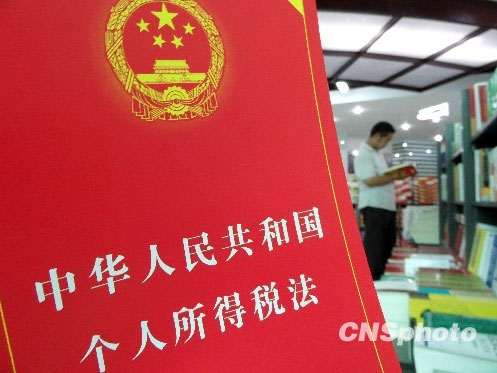(Ecns.cn) – More than 60 million Chinese citizens will stop paying taxes once the raise of the threshold for personal income tax becomes effective on Thursday.
The State Council in April proposed raising the income tax threshold from 2,000 yuan to 3,000 yuan in a bid to boost consumer spending and ease the tax burden on low-wage earners. In June it decided to raise the proposed threshold to 3,500 yuan a month.
It also reduced the tax rate for the lowest income earners from 5 percent to 3 percent.
The adjustment takes effect on Sept. 1 and will cut the number of taxpayers from 84 million to 24 million.
The government expects to take in 160 billion yuan less in income taxes annually.
The new amendment is designed to narrow the widening wealth gap, said Zhang Bin, a professor at the Institute of Finance and Trade Economics of the Chinese Academy of Social Sciences.
However, middle- and low-income earners will feel the impact of taxes even more than high earners, Zhang added. He said the tax threshold should be raised even further to make it fairer.
According to Zhang, although the new tax policy will have certain limited effects on a few people, it will not greatly change the lives of residents due to soaring inflation.
A "drop in the bucket"
Mr. Zhao, who lives in Nanjing, capital of East China's Jiangsu Province, is a prime example of what Zhang is talking about. His family can expect to pay about 150 yuan less in income tax next month. Nevertheless, he plans to stick to a tight budget routine that has worked for him so far.
The 50-year-old started working half-days six years ago when production slowed at the machinery plant where he works. Because his afternoons are free, he can compare the prices of food and daily products at different markets to make sure what he buys is the cheapest.
Zhao also stays alert to information about discounts, and notices when prices change on everything from food and small commodities to clothing and appliances. He even started eating more chicken when the price of pork jumped nearly 60 percent early this year.
Kang Shiyang is a 24-year-old teacher in Shanghai who earns 2,500 yuan a month, which means he will directly benefit from the change. Under normal circumstances, he is able to save about 500 yuan a month.
However, the new tax policy will not ease the high pressure caused by inflation and dramatically increasing consumption in the city, where "it's nearly impossible for low-income people to survive," Kang told China Daily.
Kang said he has been avoiding going out for social activities with co-workers and friends during the weekend to save money.
Chen Yang, a 25-year-old salesman, moved to Shanghai from Hubei province more than a year ago. He sees the 300 or so yuan he won't pay in taxes every month as a drop in the bucket.
"My current monthly salary is 2,500 yuan, including a bonus, and the basic expenses of rent, food and transportation nearly cost 2,000 yuan, if I don't go out for any activities or short-distance travel."
To save money and send some to his parents, Chen has chosen to minimize the cost of rent and food to cut expenses.
He lives in a 5-square-meter room in a 4-room apartment, sharing a bathroom and kitchen with 10 other people, where his rent and other bills run about 850 yuan a month. "The living conditions are much better than I used to have, when I had to share a tiny room with two other roommates."


















